- Home
- Glynnis Campbell
MacAdam's Lass Page 2
MacAdam's Lass Read online
Page 2
Ironically, much of his golfing aptitude came from the training his uncles had given him with a sword. His grip was solid, yet not too tight. Flexibility, whether holding a blade or a golf club, was the key to control and accuracy. The rest of his skills he’d learned from Lowland golfers who were more than willing to show a stranger a thing or two about golf for a few pints of beer.
Drew glanced up once toward the hole, which was slightly to the right on the rise ahead. ’Twas hardly necessary—he could have played the Musselburgh links blindfolded.
The Scots who’d wagered on Horn gathered as closely around Drew as they dared, yelling and stomping and waving their hands in an effort to break his concentration.
Taking an even breath, Drew shifted his weight back then forward, swinging the club with smooth power. It whistled and connected with a solid crack. The ball shot straight ahead, rolling and bounding down the green like a hound on the hunt, slowing and settling directly in front of the hole.
Horn made a pained, strangling noise, which he quickly disguised with a cough, and his constituency groaned in collective disappointment. Then he waved to his servant to bring along his satchel of clubs as he shuffled off toward his ball.
Drew always carried his own clubs. He refused to engage a servant to do something he could do just as well himself. Besides, he preferred to keep the Scots at arm’s length, and that included the serving class. He was an Englishman masquerading as a Highlander, and the fewer who knew his secret, the better.
As they ambled down the course, trailed by the disgruntled crowd, Horn tried to strike up a probing but friendly conversation. “So, MacAdam, have ye played much at Musselburgh?”
“A time or two.” The truth was he’d played at Musselburgh enough to have memorized the lay of the land. This might be the country of his foe, but he liked it well enough to spend a good deal of time here. There was a wild quality about the eastern coast of Scotland that pleased him.
Horn’s servant, upon reaching his ball, extracted a fairway club from the satchel. Drew cleared his throat, wondering if the servant had made a mistake in his choice. After all, the ball wasn’t that far from the hole.
But the servant arched a knowing brow at Drew. The crowd hushed, and Horn lined up behind the ball, wiggling his backside to get the proper posture. When he finally swung forward, the servant’s choice proved to be a prudent one after all, for Horn all but missed the shot, only narrowly clipping the top of the ball, which rolled forward to end up, by fool’s luck, beside Drew’s.
The Horn faction cheered, and Drew let out a whistle of disbelief, which Horn mistook for admiration.
“Aye, we Lowlanders have golf in our blood,” Horn boasted, resting his club on his shoulder and marching happily forward. “Tell me, MacAdam,” he said loudly enough for the onlookers to hear, “do they even play the sport where ye’re from?”
In England? Drew thought. Not anymore. Golf had been outlawed there. But that wasn’t what Horn was asking. As far as anyone knew, Drew MacAdam was born and bred in the Highlands. No one here had heard of the Englishman, Andrew Armstrong. Still, these Lowlanders had almost as much contempt for their northern brothers as they did for their English foes.
“In Tintclachan?” Drew replied in his best Highland brogue. “Nae. There’s naught but rocky ground and lochs so deep ye’d drown chippin’ your way out.”
“Indeed?” Horn nodded to the crowd, as if to confirm that a Highlander couldn’t possibly have the experience to win this match.
“Aye.” Drew nodded out of courtesy to indicate Horn could play first. “And ye’d be lucky to swing a club without hittin’ a cow.” He gave the bystanders a wink, and the few of them who’d wagered on Drew to win chuckled in response.
Horn took a putting cleek from his servant, who then spread a cloth on the grass before the ball and helped his master to his knees. Horn doubled at the waist to line up his shot, his hands flat on the ground, his arse in the air. He cocked a wild eye at the hole as if to threaten it into submission. Then he straightened, and with three practice swings, he knocked the ball forward, missing the hole by more than a foot.
“Damn!”
The crowd’s oaths were somewhat coarser. Some of them had wagered a week’s earnings on Horn to win.
The servant helped Horn struggle to his feet while Drew waited without comment. Just as he’d expected, this was going to be an easy match. Horn was already losing his temper on the first hole. By the seventh, he’d doubtless be apoplectic and completely unable to control his shots.
Drew advanced toward his ball. With scarcely a wasted motion and before the onlookers could distract him with their taunts, he tapped it neatly into the hole.
Horn started in surprise. “Oh.” He added grudgingly, “Well done, MacAdam.”
After that, it took the man not one, but two more attempts to sink his ball. By then his ears were red, and the onlookers were growling in irritation.
“Your drive,” Horn muttered.
Drew nodded and walked past the green to tee off. The path to the second hole was much longer, with a marshy patch in the middle. On a sunny day, he could do it in five strokes. Today, with the mist heavy on the course, ’twas hard to tell.
He lined up the shot with his longnose club while the mob closed in, whistling and jeering. Ignoring the detractors, he swung back, but as he swung forward, an overly enthusiastic Horn supporter waved out his arm, and Drew’s club caught on the man’s sleeve, destroying the shot. The ball sliced to the right, landing near the edge of the rough.
Half of the crowd cheered in approval, willing to seize on any advantage. The other half, recognizing the man’s behavior as unsporting, shoved and rebuked the offender.
Drew frowned. He’d seen men cheat like this before. ’Twas one thing to bellow and stamp and cast aspersions. ’Twas another to physically interfere with a man’s shot.
Horn, however, was a man of some character. “Ye can take the shot o’er, MacAdam,” he offered.
Drew nodded his thanks. But to be honest, he didn’t want to take all of the challenge out of the game. “Nae, let it lie.”
Horn seemed unsure whether to be grateful or insulted. He nodded in deference to Drew’s courtesy, then took the club from his servant and groused at the onlookers, “I’ll play my own game, if ye please.”
While they moved down the course and Horn carried on about unruly crowds, Drew grunted, only half listening. He was distracted by the sight of something odd upon the waves in the distance—strange shadows shifting through the veil of mist. As he scanned the horizon, the dark flank of a ship emerged from the fog. Ghostly white sails billowed on its three masts as it sailed toward Leith Harbor. Behind it another vessel materialized.
Horn, oblivious to the ships, chattered away as he struggled to keep up with Drew. “’Tis a foul day for this time o’ year—not golfin’ weather at all.”
Drew stopped, squinting to try to make out the colors of the flag flying from the highest mast.
“I suppose it could be worse,” Horn blathered on. “It could be rain—”
He suddenly crashed into Drew with an “oof,” but Drew was too preoccupied to take notice. Ships came into Leith Harbor all the time, but there was something different about this pair.
“Those galleys,” Drew said, “whose colors are they flyin’?”
Horn sputtered, then shaded his eyes with one hand to try to make out the ships.
His servant joined them. “They’re French, sir.”
“French.” Two French galleys sailing up the Thames in London would have presented a threat. But here, Drew reminded himself, there was a strong alliance between France and Scotland that went back centuries.
“Aye, right ye are,” Horn chimed in, pretending he could see that far. “They’re French. Ye can tell by… Wait.” He straightened abruptly. “French? French? Is it…” He elbowed his way past Drew and scrambled through the rough to get a better look. “Nae. It couldn’t be. She wasn’t due to arr
ive for another two days!”
“She?” Drew asked, turning to the servant.
The crowd began murmuring in wonder as the servant gazed into the distance with curious adoration. “The new queen,” he breathed.
Chapter 2
SELKIRK, SCOTLAND
“Ye’ll not best me this time, old man.”
Will scowled at his young protégé and pushed back his sleeves, revealing his thick, hairy forearms. “Will ye ne’er learn to respect your elders?” He raised his dagger and shook his head, muttering, “Old man indeed.”
The two had sparred together so often that they’d memorized each other’s strengths and weaknesses, ploys and habits. But this week, Will’s favorite student had learned a new trick from Angus. Today the master would taste defeat at the hands of his apprentice. The stakes were high, the prize priceless.
Will’s first advance came, as always, across and down from the right in a diagonal slash. ’Twas predictable and easy to dodge.
His second strike was always a return from the left. It might come in low or high. Today the arc was at shin-height, low enough to jump over.
The advance had to be quick then. There was only a second or two to reply.
One immediate forward thrust sent the old man scuttling back, followed rapidly by a downward slash, which forced Will to dodge to the side.
Once a man was on the defensive, Angus had said, he’d reply with hasty desperation, and his blows might be incautious. ’Twas then the risky move would have to be made.
When the old man’s awkward, defensive slash whistled from left to right, his opponent needed precise, lightning-quick calculation and sheer nerve to step sideways into the blade’s path. Thankfully, the measurement proved accurate. Will’s dagger sliced superficially through cloth and flesh, not enough to cause too much damage, just enough to sting like bloody hell.
As predicted, Will dropped his weapon in shock at what he’d done. “Jossy!” he cried.
Just as Angus had suggested she do, Josselin played up the injury. She gave a feminine gasp, winced, and staggered, letting Will get a good look at her wounded left arm, but never letting go of the blade in her right.
With horror in his eyes, Will stepped forward. “Jossy, lass, are ye—”
“Aha!” Before he could finish, she swung the tip of her dagger up to rest it at his stubbled throat. “I win.”
“What?” His bewildered gaze almost made her regret her trickery. Almost.
“I win.” She gave him a grin of triumph.
His confusion turned rapidly to anger. “Win, my arse,” he spat. “Ye cheated, brat.”
“I didn’t cheat,” she said with an injured sniff. “Ye can see the blood.”
“I can’t believe ye’d do that on purpose,” he scolded. “I could have cut ye badly, ye fool wench.” He shook his head. “Who taught ye such deceit?”
“’Tisn’t deceit,” she said, avoiding the question. After all, ’twould make Will jealous if he knew he wasn’t her only teacher. “’Tis cleverness.”
He batted her dagger away. “Cleverness, my ballocks,” he grumbled. “Ye’ll get yourself killed with such cleverness.”
“But I win, right?” she said. “I get to go to Edinburgh to see the new queen.”
He muttered something under his breath that sounded suspiciously like an expletive.
“Ye promised,” she warned.
“Aye, that I did. Never let it be said I’m not a man o’ my word. But,” he said, wagging his finger at her nose, “ye’re goin’ to promise me somethin’ in return.”
Josselin’s heart was beating so fast with the thrill of winning the wager that she didn’t care what his promise was. “Aye?”
“Ye’ll go as a lad.”
“What?”
“Ye heard me.”
“What do ye mean?”
“Ye’ll get yourself some trews, a baggy shirt, and boots,” he told her. “And a hat big enough, Mistress Goldilocks, to hide your hair and those connivin’ green eyes.”
Josselin furrowed her brows. “Why?”
“For protection.”
She brought her blade up swiftly. “I’ve got this for protection.”
“Don’t argue with me, lass, or ye’ll not go at all.”
“But ye swore. Ye said if I bested ye, I could go to Edinburgh.”
“So I did, and I’ll be true to my word…even if ye did cheat.”
“I did not—”
He held up a hand to silence her. “But if ye don’t agree to my terms, I can’t promise I won’t have a slip o’ the tongue in front o’ Kate about the mischief ye’ve been up to these past few years.”
She whisked her dagger back down and looked at him in hurt disbelief. “Ye wouldn’t.”
He folded his arms over his stocky chest. “Only if ye force me to it.”
She huffed out a vexed puff of air. “Oh, fine. I’ll go as a bloody lad.”
She sheathed her weapon and unbuckled the belt from her hips, handing it to Will. As they walked back toward the tavern, Josselin smoothed her skirts and loosed her braid, letting the waves fall around her shoulders and down her back, then tied on her linen coif. Kate mustn’t know she’d been fighting. ’Twould break the woman’s heart.
Will brought up Kate Campbell any time he wanted to keep Josselin under his thumb. Kate, a prosperous brewster, had taken Josselin in when she was twelve years old, claiming ’twas unseemly for three unwed men to raise an orphaned lass, pointing out that they’d taught her nothing but sparring, spitting, and swearing.
But despite the woman’s kindness, Josselin had burst into tears as she’d been forced to leave behind the three men she called “Da” to move her things into the room over Kate’s tavern.
Will had taken pity on her. He’d whispered to her that if she promised not to tell Kate, he’d continue sparring with her every Monday morn. After all, he’d sworn on her mother’s grave that he’d teach Josselin how to defend herself properly.
What Will didn’t know was that her second da, Angus, had made a similar arrangement. They met to cross swords on Wednesday afternoons, to honor the memory of her brave father, killed in battle.
And neither Angus nor Will knew about her engagements with her third da, Alasdair, who dedicated Fridays to teaching Josselin how to read, do sums, and, if nagged enough, how to wield a dagger with lethal grace.
As far as her foster mother knew, Josselin went off for several hours a week to gather flowers, do embroidery, or visit with friends. That was in addition to her regular work, which was serving beer at the tavern and managing the brewster’s accounts.
“Ye’d better keep your wits about ye in Edinburgh,” Will muttered as they crossed the field toward town. “’Tisn’t Selkirk, after all.”
“I’ll keep my wits and my blade about me, Da.” She called all three of her fathers “Da.” It got confusing sometimes, but none of the three would surrender the title.
“Half o’ Scotland is determined to get a peek at the new queen,” he said with a shudder, making his graying beard quiver. “There’s bound to be an enormous crowd.”
Josselin’s heart raced, imagining the grand procession…hundreds of people waving scarves and cheering…French soldiers on horseback and lairds from all over Scotland marching through the streets…musicians and players and dancers making festive displays. And floating like an unruffled goddess above the din and ceremony would be Queen Mary with her constant companions, the Four Maries.
“Get that glimmer right out o’ your eyes, lass,” Will groused. “’Tis a dangerous place, the city. And not everyone will be so glad to see the queen.”
“How could they not?” Josselin broke off a purple thistle growing beside the path. “She’s been gone for twelve years. ’Twill be a triumphant return.” She smiled, tickling Will’s cheek with the blossom.
He scowled and brushed it away. “She’s a Catholic, and there are those who don’t much care for the old religion.”
Jos
selin thought that was silly. What did it matter where a person worshipped on Sunday? Scotland was finally going to have her own real queen. And from all reports, Mary was beautiful and powerful, intelligent and charming.
“Mary is strong,” she decided. “She can defend herself.”
“Not accordin’ to Knox.”
“Hmph.” Josselin had heard men in the tavern talking of John Knox, the Protestant zealot. It seemed many were swayed by his charismatic speeches. “I hardly think one nasty old man with a waggin’ tongue can wield much influence.”
“Perhaps not, but he has powerful friends.”
Josselin straightened with pride. “Well, so does the queen.” More than anything, Josselin wanted to live up to her mother’s legacy, to fight the foes of the crown, to triumph where she had fallen. “Who was it taught me,” she added pointedly, “that the best defense is a strong offense?”
Will stopped in his tracks, grabbed her by the shoulders, and spun her to face him. In that one instant, his fierce frown took all the wind from her sails. “Ye’ll not tangle with the likes o’ Knox, do ye hear me?”
Josselin gulped. She wasn’t afraid of Will, but she did respect him.
“He’s a dangerous man,” Will said. “All fanatics are. Ye can go do your merrymakin’, watch the hurly-burly, and steal a peek at young Mary from a distance. But ye steer clear o’ Knox and his ilk.”
She wriggled loose of his hands. “I’ve no interest in the man anyway. Ye fret too much, Da.”
“Ye give a man much to fret about,” he said, shaking his head and sighing unhappily as they continued down the path. “What are ye goin’ to tell Kate about that gash on your arm?”
She shrugged. “I’ll say I fell off the beer cart.”
He arched one grizzled brow. “Again?”

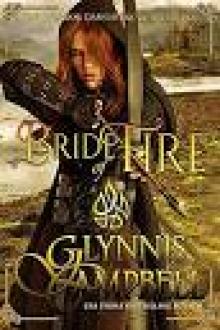 Bride of Fire
Bride of Fire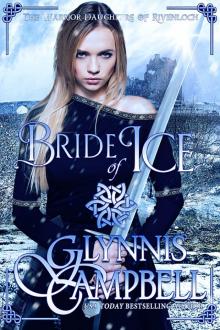 Bride of Ice
Bride of Ice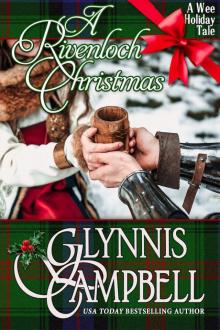 A Rivenloch Christmas
A Rivenloch Christmas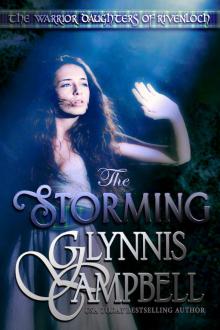 The Storming
The Storming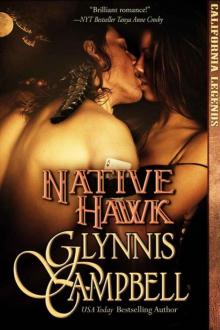 Native Hawk (California Legends Book 3)
Native Hawk (California Legends Book 3)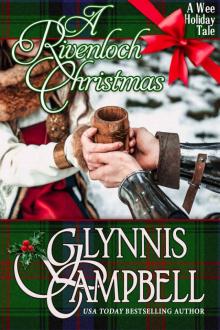 A Rivenloch Christmas: A Wee Holiday Tale (The Warrior Daughters of Rivenloch Book 0)
A Rivenloch Christmas: A Wee Holiday Tale (The Warrior Daughters of Rivenloch Book 0)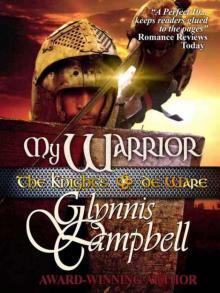 Knights of de Ware 02 - My Warrior
Knights of de Ware 02 - My Warrior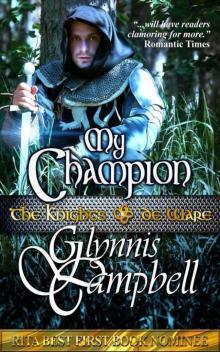 Knights of de Ware 01 - My Champion
Knights of de Ware 01 - My Champion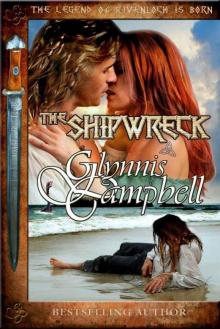 The Shipwreck
The Shipwreck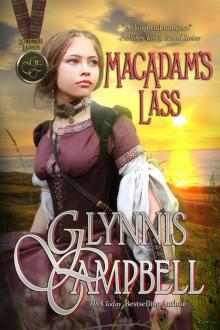 MacAdam's Lass
MacAdam's Lass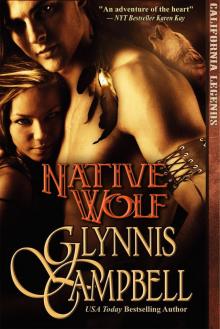 Native Wolf
Native Wolf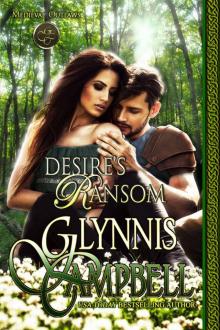 Desire's Ransom
Desire's Ransom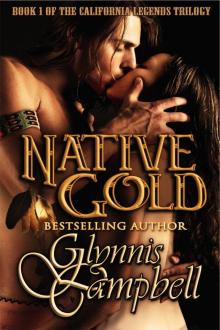 Native Gold
Native Gold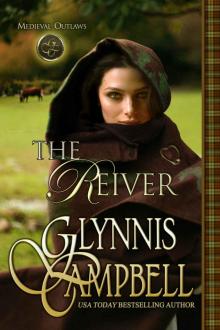 The Reiver
The Reiver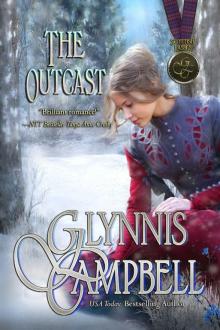 The Outcast
The Outcast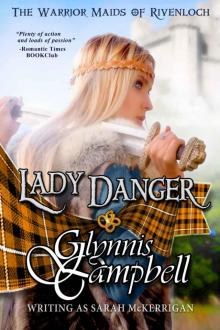 Lady Danger (The Warrior Maids of Rivenloch, Book 1)
Lady Danger (The Warrior Maids of Rivenloch, Book 1)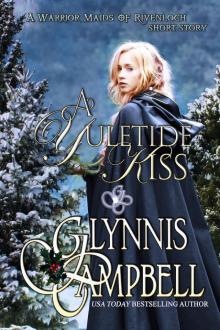 A Yuletide Kiss
A Yuletide Kiss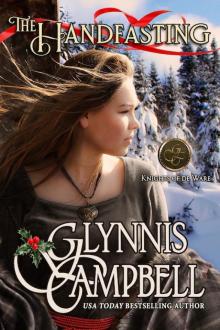 The Handfasting
The Handfasting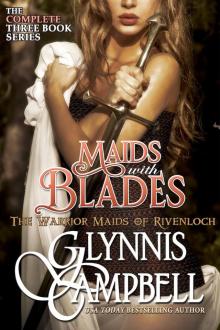 Maids with Blades
Maids with Blades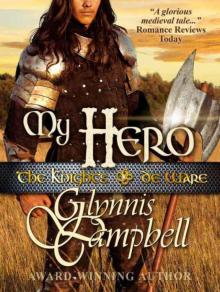 Knights of de Ware 03 - My Hero
Knights of de Ware 03 - My Hero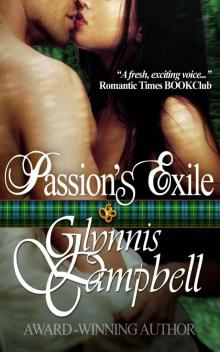 Passion's Exile
Passion's Exile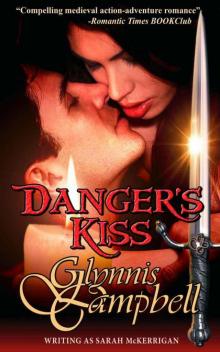 Danger's Kiss
Danger's Kiss Highlanders for the Holidays: 4 Hot Scots
Highlanders for the Holidays: 4 Hot Scots